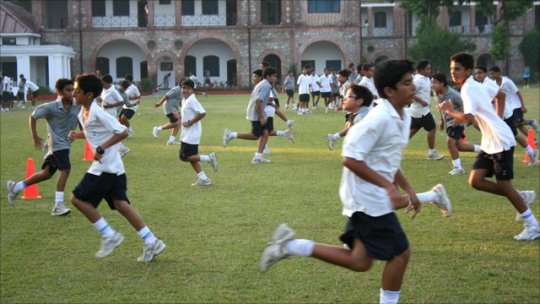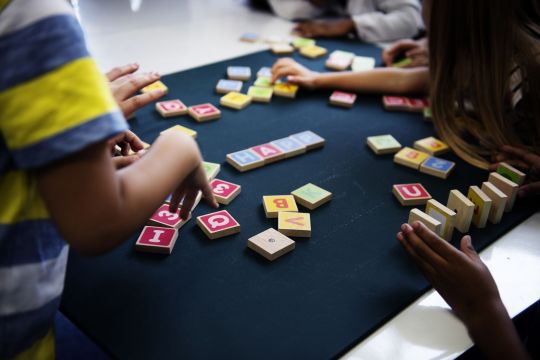#CbseSchoolsinchhattisgarh
Photo

Observe the candidate's action carefully
The problem with going “off script” too much is that you can’t compare one candidate’s answers to another. But it is good to ask follow-up questions about how a person feels or how they have reflected on a situation. If a question comes up about a time when a candidate grew or learned something new, it is good to ask “How did you feel about that?” or “Was that hard for you?” This digs a little deeper into the growth mindset of a person and is just one example of a follow-up question that could give more insight into a candidate.
School Information Initiative by Sharda Vidyalaya
For the latest updates, visit our Social Media
#teachersareimportant#teachersinschools#hiringgoodteachers#bestactivityschoolinbhilai#bestcbseschoolforkidsinbhilai#topcbseschoolsinbhilai#bestlearningfacilityschoolinbhilai#emotionallearning#importanceofteachers#CbseSchoolsinchhattisgarh#PrimarySchoolsinBhilaichhattisgarh#schoolsinbhilai#BestSchoolsinBhilai#CBSESchoolsinBhilai#PrivateSchoolsinBhilai#bestcbseinstitutesinbhilai
0 notes
Photo

Teachers help in making learning fun
Teachers always make their classes interesting and fun instead of explaining concepts through lectures in a very technical fashion by including game-based learning and competitions to get students more involved and alert at all times. This definitely creates interest among students and give them an opportunity to interact with each other.
School Information Initiative by Sharda Vidyalaya
For latest updates, visit our Social Media
#teachersinschools#teachersareimportant#bestactivityschoolinbhilai#bestcbseschoolforkidsinbhilai#bestlearningfacilityschoolinbhilai#topcbseschoolsinbhilai#sociallearning#importanceofteachers#CbseSchoolsinchhattisgarh#bestcbseinstitutesinbhilai#PrimarySchoolsinBhilaichhattisgarh#schoolsinbhilai#CBSESchoolsinBhilai#BestSchoolsinBhilai
0 notes
Text
Importance of Teachers in Student’s Life

Teachers play vital roles in the lives of the students in the long run. Teachers are best known for the role of educating the students that are placed in their care. Beyond that, teachers serve many other roles in the classroom. Teachers set the tone of their classrooms, build a warm environment, mentor and nurture students, become role models, and listen and look for signs of trouble.
Here are some effective ways in which you can motivate and teach students–
1. They draw Connections to Real Life
While studying different subjects, students often wonder if they will ever make use of the knowledge in real life? They generally believe that what they are learning is not important and has no purpose. A good teacher should cite examples and demonstrate how the subject relates to everyday life and how it can be used in the future.
2. They step away from textbooks
Bringing in material that your students can connect with, and that matches their needs and interests can improve the lesson output. Create activities and games to show them that you are also prepared to put in a lot of effort that will help them to succeed.
3. Tracks complete improvement
Always remind students that they have come a long way from where they started. Set short-term goals, emphasize improvement, keep self-evaluation forms to fill out and compare throughout the year. This helps them monitor their progress and acts as a confidence booster.
4. Helps in making learning fun
Teachers always make their classes interesting and fun instead of explaining concepts through lectures in a very technical fashion by including game-based learning and competitions to get students more involved and alert at all times. This definitely creates interest among students and give them an opportunity to interact with each other.
5. They encourage students from time to time
Students often look to teachers for approval and are more likely to be enthusiastic about learning if they feel that their work is valued and recognized. Open communication and free-thinking can do wonders for the students and make them voice their opinions with confidence. A “good job” can go a long way!
6. Slightly delivers the skill of Controlling various activities
If the students take ownership of how the classroom activities are carried out, they will feel happy and relaxed. Take an audit of your class, by asking students what they enjoy, what helps them learn, what they’re excited about after class. After reviewing the answers, integrate their ideas into the classroom sessions and witness the increase in student engagement.
While a deep and broad knowledge of the subject is essential for being a good teacher, a lot also depends on how the knowledge is passed on to the students. The focus should not be on learning notes and securing marks but on a lucid understanding of the subject and holistic development of the child. A teacher is a nurturer and her role go beyond academics, she is responsible for creating a love for life-long learning and advancement.
School Information Initiative by Sharda Vidyalaya
For the latest updates, visit our Social Media
#CBSESchoolsinBhilai#BestSchoolsinBhilai#PrivateSchoolsinBhilai#PrimarySchoolsinBhilaichhattisgarh#schoolsinbhilai#CbseSchoolsinchhattisgarh#bestcbseinstitutesinbhilai#emotionallearning#importanceofteachers#sociallearning#topcbseschoolsinbhilai#bestcbseschoolforkidsinbhilai#bestlearningfacilityschoolinbhilai#teachersinschools#bestactivityschoolinbhilai#teachersareimportant
0 notes
Photo

Sports help to boost the motivation of the Students
Sports involve working towards specific achievements. Every game and every practice session can help children have an optimistic, forward-looking view of life. Children are rightly excited about achieving their small goals, such as winning a game, visiting another town where a tournament is being held, or putting on new equipment for the first time. Teaching them to look forward to the future will help them later on to make it through difficult moments of failure, injury, or loss.
Website: http://www.shardavidyalaya.edu.in/
#CBSESchoolsinBhilai#BestSchoolsinBhilai#PrivateSchoolsinBhilai#sportsforstudents#sportsandgames#bestcbseschoolforkidsinbhilai#bestlearningfacilityschoolinbhilai#topcbseschoolsinbhilai#bestcbseinstitutesinbhilai#importanceofsports#sociallearning#bestactivityschoolinbhilai#CbseSchoolsinchhattisgarh#PrimarySchoolsinBhilai
0 notes
Text
6 Reasons Why Sports plays a Vital Role in Student’s Life

When children are engaged in activities which align with their particular interests, their psychosocial development is enhanced. They not only learn a variety of useful skills, they learn to express themselves, go on a journey of self-discovery, and grow into adulthood with an authentic set of characteristics and values.
Earlier a child starts getting in shape, the more she'll reduce her risk of numerous illnesses. Here are some of the benefits that physical activity offers your child:
1. It helps to understand one’s responsibility
Sports are often where children first find themselves with responsibilities outside of the home. They need to take care of their equipment, be punctual to their practice sessions and games, and play in the position the coach assigns them, both on good days and on the days when they don’t really feel up to it.
2. Friendship
A team is a marvelous opportunity to get to know other children and to create a group of friends. Your kids will spend many hours of their childhood with their teammates, and that can create bonds that last a lifetime. This is even more true if the parents get to know the parents of the other teammates, and establish social relationships with them, such as going to watch the games together.
3. Learning to get along with each other
When children participate in team sports, they have to learn to cooperate with other children who are not their siblings. They learn to share, to help others, to dialogue, and to teach things to other children outside the context of the classroom and the family.
4. It boosts the motivation of the Students
Sports involve working towards specific achievements. Every game and every practice session can help children have an optimistic, forward-looking view of life. Children are rightly excited about achieving their small goals, such as winning a game, visiting another town where a tournament is being held, or putting on new equipment for the first time. Teaching them to look forward to the future will help them later on to make it through difficult moments of failure, injury, or loss.
5. It helps to develop the sense of respect
Learning the importance of paying attention to the words of their coach, of their family, and of their teammates helps them to learn respect, patience, and self-control, even when emotions are running high, such as when a referee makes a bad call.
6. Cooperation
When on a team, everyone needs to work together, from the players to the coach, from the goalie, quarterback, or pitcher to the linebackers, midfielders, or catcher. In addition, the children establish a relationship with the spectators who encourage them during the game.
School Information Initiative by Sharda Vidyalaya
For latest updates, visit our Social Media
#CBSESchoolsinBhilai#BestSchoolsinBhilai#PrivateSchoolsinBhilai#PrimarySchoolsinBhilai#CbseSchoolsinchhattisgarh#bestcbseinstitutesinbhilai#emotionallearning#sociallearning#importanceofsports#topcbseschoolsinbhilai#bestlearningfacilityschoolinbhilai#bestactivityschoolinbhilai#bestcbseschoolforkidsinbhilai#sportsandgames#sportsforstudents
0 notes
Text
What is the Necessity of Social – Emotional Learning in the Schools?

Developing these core life abilities through social and emotional learning (SEL) is critical to a child’s development, as it directly correlates to success and happiness as an adult. For many children, school is the only place where any deficiencies in these abilities can be addressed before they become active members of society.
Combining these skills with academic development creates high-quality learning experiences and environments that empower students to be more effective contributors in their classrooms today and in their workplaces and communities tomorrow.
1. Self-Management
Self-management requires skills and attitudes that facilitate the ability to regulate one's own emotions and behaviors. This includes the ability to delay gratification, manage stress, control impulses, and persevere through challenges in order to achieve personal and educational goals.
2. Teaches teamwork and collaboration
In order to be success now and in the future, kids need to learn how to work well with others. Social emotional learning skills help students learn how to work collaboratively with partners and small groups. That includes working with people who aren’t your friends, problem-solving through disagreements, being a good team player, and more.
Of course, these are all skills that are critical to success in the classroom, too.
3. Improves self-regulation skills
Being able to managing our own thoughts, feelings, words, and actions is paramount to social and personal success. SEL can help learners understand self-regulation so they can learn to manage their own behaviors in positive ways.
4. Self-Awareness
Self-awareness involves understanding one's own emotions, personal goals, and values. This includes accurately assessing one's strengths and limitations, having positive mindsets, and possessing a well-grounded sense of self-efficacy and optimism. High levels of self-awareness require the ability to recognize how thoughts, feelings, and actions are interconnected.
5. Improves confidence
All kids should feel good about themselves and who they are as individuals. In many ways, helping kids and young adults to feel more confident can help them become the best versions of themselves.
6. Teaches coping skills
All kids and young adults experience emotional distress from time to time. Managing emotions can be tough, especially if learners don’t have the tools to do it effectively. An important component in social emotional learning programs is teaching kids and young adults how to managing those feelings and cope with them in the best ways.
7. Creates a feeling of community
A positive school community is critical to help all learners succeed. By building relationships and talking about topics that really matter to kids, they are more likely to bond with each other and educators in the room. This creates a strong sense of community, acceptance, and support.
Students require more than merely academic knowledge to thrive. They need transferable soft skills that will allow them to understand others and work collaboratively to achieve desired outcomes. Providing tools for developing children to manage their emotions and problem solve can allow them to better contribute to their schools, workplaces, and communities. SEL is an approach that presents a unique opportunity for educators, administrators, and school districts to make a positive impact on affected communities for years to come.
School Information Initiative by Sharda Vidyalaya
For latest updates, visit our Social Media
#Cbseaffiliatedschoolinbhilai#Cbseaffiliatedschoolinchhattisgarh#CBSESchoolsinBhilai#BestSchoolsinBhilai#PrivateSchoolsinBhilai#BestCBSESchoolsinBhilaiChhattisgarh#PrimarySchoolsinBhilai#CbseSchoolsinchhattisgarh#bestboardingschoolsinbhilaicbse#bestcbseinstitutesinbhilai#emotionallearning#sociallearning#benefitsofmoralvalues
0 notes
Photo

The better approach of a Teacher towards the Students is to keep our voices at normal volume and tone. Set the rules of engagement for them. Explain that you’ll be happy to listen or talk with them about the issue if they can do so in a more reasonable way.
It is not easy for them to pull all together, give them some space and time to cool down. Revisit the issue later when everything isn’t so emotionally charged. But be sure they know you’re not blowing them off or letting them off the hook. Setting a specific time, like after dinner or the upcoming weekend could be either away, you’ve taken a power struggle and turned into something less volatile and more productive.
Website: http://www.shardavidyalaya.edu.in/
#behaviorissues#teenagerbehavior#PrimarySchoolsinBhilai#CbseSchoolsinchhattisgarh#PrivateSchoolsinBhilai#BestSchoolsinBhilai#CBSESchoolsinBhilai#Cbseaffiliatedschoolinbhilai#Cbseaffiliatedschoolinchhattisgarh
0 notes
Text
6 Steps how to deal with Teenage Behavior

Dealing with children especially with the phase of teenage is not so easy. No matter how many attempts you make, how great your relationship with your children is, you are likely to face parenting roadblocks when it comes to your teenager.
Kids, who groan, complain, and generally express negativity will become adults who do the same. Parents can help teens develop a great life skill by teaching them to keep a positive attitude about school.
Here are some tips to make your teens develop positive behavior:
1. Do not overreact in the situations:
The better approach is to keep our voices at normal volume and tone. Set the rules of engagement for them. Explain that you’ll be happy to listen or talk with them about the issue if they can do so in a more reasonable way.
It is not easy for them to pull all together, give them some space and time to cool down. Revisit the issue later when everything isn’t so emotionally charged. But be sure they know you’re not blowing them off or letting them off the hook. Setting a specific time, like after dinner or the upcoming weekend could be either away, you’ve taken a power struggle and turned into something less volatile and more productive.
2. Praise and motivate them:
Praising and Motivating has proved to be the most powerful tool in all times. When our kids do show maturity in handling a situation, whether by initiating a respectful conversation or even knowing when they need a few minutes to calm down before talking with us, we should absolutely let them know that we are proud of them.
3. Identifying Emotions is needed:
Help your child self-express via identifying feelings and choosing words carefully when frustrated or making demands. “It’s okay to tell me how you feel, but you need to speak respectfully. Even if you’re tired or upset, try to stay calm.”
4. Guide them for a positive talk:
The way we talk can actually help us feel better or worse about our own situations. While it’s important to listen to your teen share about their day, you should not allow them to continuously vent about the negative. Teens, which begin to develop an overly negative attitude about school may easily overlook all the good things that happen. Making them realize one good thing each day, reminding things to be grateful for, and providing ideas for positive self-talk, framing mistakes for the betterment of learning experiences is essential to understand.
5. Help them to solve their problems:
Problems at school can really weigh your teen down. They may feel negative because they don’t know how to handle a situation. Perhaps they are not getting along with one of their teachers, or they had a disagreement with a friend. Whatever the situation, instead of just letting your teen complain and vent their negative attitude, use it as an opportunity to teach problem-solving skills, a vital tool they will need their entire life.
6. Encourage them to actively participate:
Looking forward to afterschool activities can make the school day feel more enjoyable. Encourage your teen to sign up for clubs, play sports, or join band. A teen who doesn’t love academics may develop a more positive attitude if they have something to look forward to at the end of the day. They can develop new friendships with teens who have similar interests or discover a mentor in the teacher who leads the club or sport, all of which keep them more engaged in school.
Teens having good critical thinking, planning, and problem-solving skills, tend to think more positively than their peers. Parents and teachers can role model and teach these skills to youth. Be sure to praise any effort your teen makes at thinking more positively. Positive thinking will help them in school and well into their future.
School Information Initiative by Sharda Vidyalaya
For latest updates, visit our Social Media
#Cbseaffiliatedschoolinbhilai#Cbseaffiliatedschoolinchhattisgarh#teenagerbehavior#behaviorissues#CbseSchoolsinchhattisgarh#CBSESchoolsinBhilai
0 notes
Text
How to study well for the exams?

Change your study material if it's demoralizing you from studies. Visual aids can be really helpful when revising. At the start of a topic, challenge yourself to write down everything you already know about a topic - and then highlight where the gaps lie. Closer to the exam, condense your revision notes into one-page diagrams. Getting your ideas down in this brief format can then help you to quickly recall everything you need to know during the exam.
School Information Initiative by Sharda Vidyalaya
Source: https://shardavidyalaya.livejournal.com/1175.html
#cbseaffiliatedschoolinbhilai#Cbseaffiliatedschoolinchhattisgarh#BestSchoolsinBhilai#CBSESchoolsinBhilai#PrivateSchoolsinBhilai#PrimarySchoolsinBhilai#CbseSchoolsinchhattisgarh
0 notes
Photo

Finals week can be the most stressful time for a student, whether in high school, college or graduate school. Work hard and you will get golden results. No So, be sincere to what you want and what you aspire for.
More info:https://shardavidyalaya.livejournal.com/1175.html
School Information Initiative by Sharda Vidyalaya
#exampressure#studentsgrades#getbetterresults#PrimarySchoolsinBhilai#CBSEschoolsChhattisgarh#CbseSchoolsinChhattisgarh#studytips#KidsSchoolsinBhilai#Cbseaffiliatedschoolinbhilai#Cbseaffiliatedschoolinchhattisgarh#CBSESchoolsinBhilai#BestSchoolsinBhilai#BhilaiCBSESchools#PrivateSchoolsinBhilai#Bhilaischools
0 notes